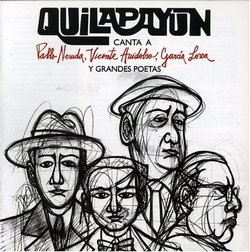| All Artists: Quilapayun Title: Canta a P. Neruda & V. Huidobro Members Wishing: 0 Total Copies: 0 Label: Wea Argentina Original Release Date: 3/31/2003 Re-Release Date: 4/7/2003 Album Type: Import Genres: International Music, Pop, Latin Music Styles: South & Central America, Andes, Chile, Latin Pop Number of Discs: 1 SwapaCD Credits: 1 UPCs: 667342883021, 685738217427 |
Search - Quilapayun :: Canta a P. Neruda & V. Huidobro
 | Quilapayun Canta a P. Neruda & V. Huidobro Genres: International Music, Pop, Latin Music
The Chilean Group Formed in 1965 Writing Lyrics Inspired by Social Issues Related to Its Country and Combining them with Autochthonous Musical Arrangements. In 1966, the Band Came in First Place at the Festival De Festival... more » |
Larger Image |
CD Details
Synopsis
Album Details
The Chilean Group Formed in 1965 Writing Lyrics Inspired by Social Issues Related to Its Country and Combining them with Autochthonous Musical Arrangements. In 1966, the Band Came in First Place at the Festival De Festivales, Releasing Its First Album that Same Year. Folk Singer and Songwriter Victor Jara Helped the Band by Promoting Quilapayun's Music and Making the Record Canciones Folkloricas De America Together. As Chilean New Song's Ambassador, Quilapayun Went on Its First European Tour in 1968. Due to Chilean Political and Social Changes in the Early '70s, the Group Settled in Foreign Countries for More Than a Decade.

 Track Listings (16) - Disc #1
Track Listings (16) - Disc #1